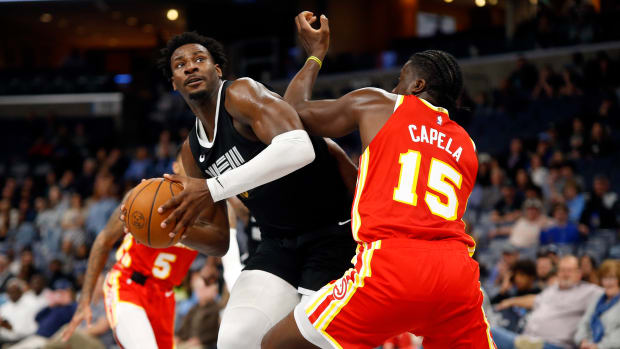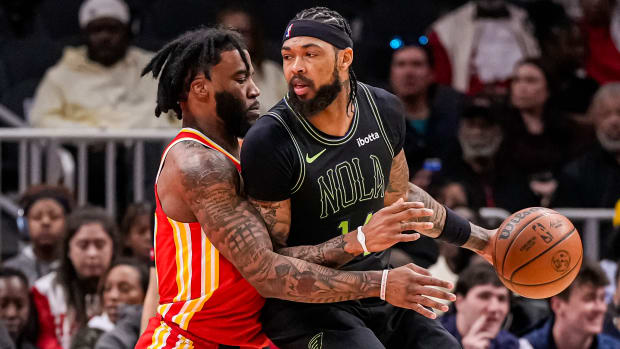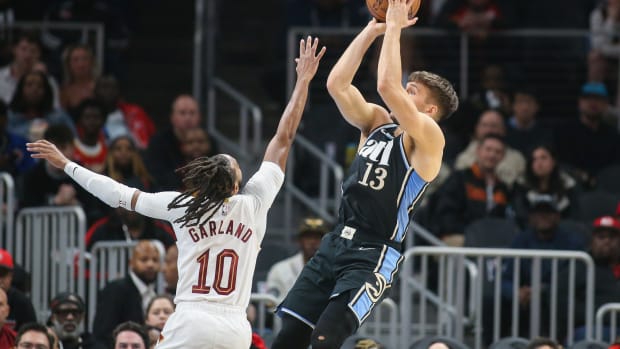2019-20 Player Review: Vince Carter
Vince Carter arrived at State Farm Arena on March 11 with no idea what chaos lay ahead. Midway through Atlanta’s game against the Knicks, Lloyd Pierce relayed the news to Carter that Rudy Gobert had tested positive for novel coronavirus. The veteran wing, who had played sparingly to that point in the game, immediately assumed a suspension of the season was imminent, but it wasn’t until he talked with Dewayne Dedmon on the bench that Carter realized he could be playing his final NBA game.
As the game wound down and the Knicks pulled away, the crowd chanted Carter’s name as DeAndre’ Bembry jokingly nudged the 43-year-old toward the court. Pierce looked down the bench at the 22-year veteran, and gave him the nod to check in. With the game’s outcome already decided, the Hawks’ only priority was to get Carter the ball. New York graciously conceded the opportunity, and Carter, still cold from sitting on the bench, dropped one last 3-pointer through the net. “I hadn’t been shooting the ball well, in my opinion, all year,” Carter said on his podcast. “But when it came down to a shot that I needed to make, it was like second nature, and I’ve done it before.”
It was a fitting end to a career that was defined by an ability to succeed outside of the spotlight. Carter’s Hall-of-Fame résumé will largely rest upon his eight All-Star selections early in his career, but his reputation comes from what happened after that. Carter had an impressive peak, but not a singular one. Instead, it was his longevity and adaptability that set him apart from anyone else who ever played the game. He will retire ranked 15th in NBA history in minutes, and third in games played. He is the only player in league history to play 22 seasons or in four different decades. In a career that featured several high-scoring seasons and numerous highlight dunks, it’s his longevity and love for the game of which Carter is most proud.
“You think of trying to play at the highest level in the NBA at 43, ‘He must love it,’ and that’s what I want to be remembered by,” Carter said after that game against the Knicks. “I just think my love for the game at this age and my ability to still compete and play is what I want people to cherish and understand.”
Like most stars of his era, Carter was most productive as a primary option. From 2000 to 2009, he averaged 23.9 points and 4.4 assists per game on above-average efficiency while almost perennially leading his teams to the playoffs. But he also had similar success in supporting roles later in his career, which underscores his malleability and value as a winning player. Few stars could have scaled into the many roles Carter did during the back half of his career. Many lack the requisite skills, like shooting, cutting, and moving the ball quickly, but even more lack the ability to put aside the desire to be a focal point.
Most players become less efficient as they age out of their primes. Those that can accept a corresponding decline in usage tend to stick around. In sports, aging is like wading into an ocean. In shallow water, oncoming waves might have little effect (especially on a 6-foot-6, 220-pound man with world-class athleticism). But as one ventures farther out, it becomes harder to stand in deeper and more treacherous water. The person who anticipates that can ride the waves smoothly back toward the shore. The one who resists their impact goes under.
It can be difficult, after playing a certain way for so long, for players to accept that their styles might not be viable anymore. Carmelo Anthony, for example, wasn’t out of the league for so long because he couldn’t still get buckets, but because he struggled to adjust his game in a way that helped teams win games. He continued to play the same way, even as his style became antiquated and ineffective. We never had to watch Carter toil against his own basketball mortality that way. He anticipated it, and rode his decline as long as he could.
That journey culminated in Atlanta, where Carter neither played a central role nor had a chance to win a championship. He scored only 6.3 points in just over 16 minutes per game in his two seasons as a Hawk, but the 43-year-old relished the opportunity to help mentor young players as they learned the NBA ropes. Situated between Trae Young and Cam Reddish in the locker room, Carter’s guidance extended beyond the basketball court. He might help his younger teammates refine their footwork on a dribble combination one day, then advise them on how best to navigate a media scrum the next. He wasn’t a fiery or vociferous leader, but Carter didn’t hesitate to hold Cam Reddish, Trae Young, or De’Andre Hunter accountable for mistakes when necessary.
He was one of Atlanta’s most vocal communicators and devoted ball-movers, which helped connect an often fragmented team on both ends of the floor. The Hawks were slightly better this season with Carter on the court than with him off (despite him playing mostly with second units), and he was a regular in Pierce’s crunch-time lineups before John Collins returned from suspension. Individually, however, Carter had his least productive season -- which is to be expected from a 43-year-old hanging on for one last ride. He averaged a career-low five points and played fewer than 15 minutes per game for the only time in his career. Most costly was his decline as a 3-point shooter, where he had derived most of his offensive value in his first year as a Hawk but shot just 30 percent this season. Carter occasionally flashed some craft and flair from the mid-post, as he used to in Toronto and New Jersey, but on the whole those plays weren’t efficient enough to justify a regular place in Atlanta’s offense.
Carter himself would admit he’d lost a step by the end, as all players do. That he still contributed in spite of that is an accomplishment unto itself. Every player meets his decline eventually. Some drop off farther and more steeply than others. Carter can say he met his basketball end gracefully and on his own terms, even if he couldn’t see the final moment coming.
“It’s a weird way to say I’m calling it a career,” Carter said after his last game. “I’ve enjoyed each and every moment of it -- good and bad. So if this is it, it’s all good.”




